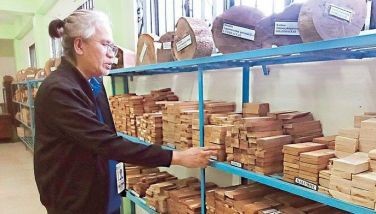Bayan Muna, Gabriela top party-list survey
MANILA, Philippines - Bayan Muna and Gabriela are the most preferred party-list groups, a recent survey by the Social Weather Stations (SWS) showed.
Bayan Muna and Gabriela obtained 8.68 percent and 5.55 percent, respectively, in the SWS poll conducted from March 15 to 17.
The two party-list groups could get the maximum three seats each based on allocation rules, SWS said.
The SWS survey used face-to-face interviews of 1,200 registered voters nationwide. BusinessWorld published the results of the SWS poll yesterday.
Akbayan came in third with 3.71 percent; followed by OFW Family Club Inc. with 3.6 percent; Coalition of Associations of Senior Citizens in the Philippines, Inc. (Senior Citizens) with 3.52 percent; Advocacy for Teacher Empowerment Through Action Cooperation and Harmony Towards Educational Reforms (A Teacher) with 3.45 percent; Magdalo Para sa Pilipino (Magdalo) with 2.83 percent; Abono, 2.6 percent; An Waray, 2.49 percent and Anakpawis with 2.45 percent.
The party-list groups are likely to get two seats each.
Meanwhile, Ang Laban ng Indiginong Filipino (ALIF) got 2.2 percent; Abante Mindanao, Inc. (ABAMIN) 2.14 percent and Kabataan, 2.03 percent. They are likely to get one seat each.
The parties winning at least two percent of the national vote are given one seat, with additional seats determined by a formula depending on the number of votes garnered, with no party winning more than three seats.
The other party-list groups that are likely to win seats if the elections were held during the survey period included Ako Bicol, 1.81 percent; Bayani, 1.69 percent; You Against Corruption and Poverty (YACAP), 1.62 percent; Agriculture Sector Alliance of the Philippines, 1.58 percent; Una ang Pamilya, 1.56 percent; Abang Lingkod, 1.38 percent; Aangat Tayo, 1.32 percent; Citizens’ Battle Against Corruption, 1.31 percent; 1st Consumers Alliance for Rural Energy, 1.26 percent; Bantay, 1.22 percent; Pinagkaisang Samahan ng mga Tsuper at Operaytor Nationwide, 1.16 percent; Buhay, 1.12 percent; Adhikaing Tinataguyod ng Kooperatiba, 1.1 percent; Abante Katutubo, 1.08 percent; Coop-NATCCO, 1.07 percent; Association of Philippine Electric Cooperatives, 0.97 percent; Trade Union Congress of the Philippines, 0.92 percent; and Alay Buhay Community Development Foundation Inc., 0.91 percent;
Sanlakas got 0.9 percent; Akap Bata, 0.83 percent; Isang Pangarap ng Bahay sa Bagong Buhay ng Maralitang Kababayan Inc., 0.79 percent; A Action Moral & Values Recovery Reform Philippines Inc., 0.78 percent; ACT Teachers, 0.77 percent; Isang Alyansang Aalalay Sa Pinoy Skilled Workers, 0.73 percent; Ating Guro, 0.72 percent; and LPG Marketers Association, Inc., 0.69 percent.
Alliance for Nationalism and Democracy got 0.68 percent; Alyansang Bayanihan ng mga Magsasaka, Manggagawang Bukid at Mangingisda, 0.66 percent; Binhi-Partido ng Mga Magsasaka para Sa Mga Magsasaka, 0.65 percent; Agri-Agra na Reporma para sa Magsasaka ng Pilipinas Movement, 0.65 percent; Bagong Henerasyon, 0.567 percent; Kalinga-Advocacy for Social Empowerment and Nation Building Through Easing Poverty, Inc., 0.562 percent; Pasang Masda Nationwide, Inc., 0.55 percent.
SWS said the names of the party-list groups are listed on the Commission on Elections website.
Lente backs SC ruling on party-list
Meanwhile, an election watchdog has rallied behind the Supreme Court (SC) on its recent decision to shake up the party-list system.
The Legal Network for Truthful Elections (Lente) said the SC ruling, which opened up the party-list system to national and regional groups not belonging to “underrepresented and marginalized†sector, was faithful to the Constitution and would even strengthen the system.
Lente executive director Louie Guia said their group agrees with the findings of the high court that party-list groups need not represent marginalized sectors, and the term marginalized should not be equated with being poor.
“This new ruling is more in line with the 1987 Constitution. If the intent of the Constitution was for the party-list system to be sectoral representation, it should have said so. Instead, the Constitution says the party-list system is for proportional representation,†he told reporters covering the SC.
Guia cited the opinion of Justice Marvic Leonen that if the party-list system is only for the marginalized sectors, those that represent certain advocacies such as the environment should not have been allowed to run.
“The implication of this ruling is that the party-list system will be more inclusive. Progressive groups must just work harder to get their seats,†he said.
“That is really the way a party-list system is understood worldwide, where a party-list group starts out small before eventually evolving into a stronger political party,†Guia added.
Poll lawyer George Garcia also welcomed the SC ruling, which was earlier criticized by election lawyer Romulo Macalintal and militant party-list groups.
Garcia, however, admitted that the Party-list Law or Republic Act 9741 “remains problematic†and must be amended or revised.
“Because the law is so vague, it became subject to several interpretations. The Commission on Elections, for one, made a wrongful interpretation, and the Supreme Court had no choice but to follow the law and the Constitution,†he said in an interview.
“One can say the ruling is a band aid solution, but a surgical and permanent solution by amending or revising the law is in order,†Garcia said. – With Edu Punay
- Latest
- Trending




























